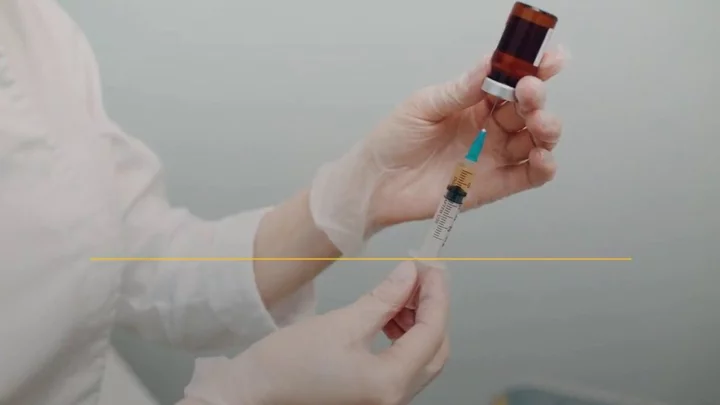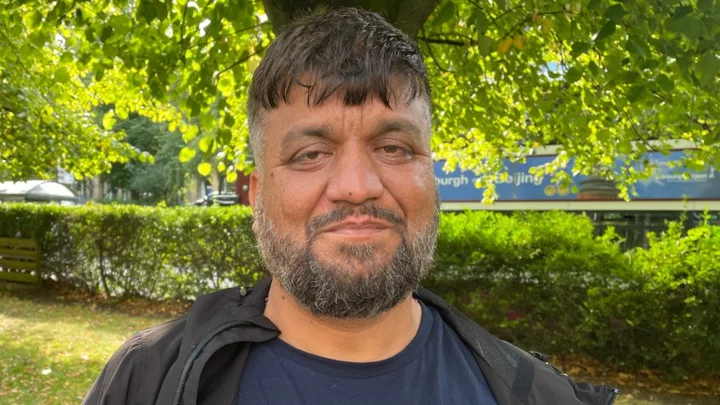
Queen Latifah calls for more ‘inclusive healthcare’ for people with obesity
Queen Latifah is calling for more inclusive medical care for people with obesity. In a new interview as part of her work with It’s Bigger Than Me, a US-based campaign by healthcare company Novo Nordisk, the actor and rapper recounted how many people with obesity experience weight discrimination from medical staff. Sharing her personal connection to the issue, the Girls Trip star – whose real name Dana Owens – toldPeople: “I saw my cousin have to deal with this issue – she was morbidly obese and she went in and out of the hospital. “There were so many things she had to face. And for a doctor to just say, ‘Oh, you need to lose some weight.’ Well, it’s not that easy. Everyone’s bodies are not the same. We all deserve specific individual care.” Latifah, 53, backed the campaign’s call for “inclusive obesity care” ensuring everyone can feel “welcome and respected” when they visit the doctors. “Imagine how good it must feel when a patient walks through that door and sees the appropriate chairs or office set-up, that someone has considered them, has taken the time to think about what their needs are,” the Hairspray star said. “There’s a sense of, ‘I’m respected here. I’m welcome here’... If you’re discouraged to get into your doctor’s office, then that’s not a good thing.” When a person is defined as obese, this means that they are overweight “with a lot of body fat”, the NHS says. The World Health Organisation (WHO) explains that the terms “overweight” and “obesity” are used to refer to “abnormal or excessive fat accumulation that presents a risk to health”. It is estimated 64 per cent of adults in the UK are obese or overweight. Last summer, a British study found that obese patients were being “weight-shamed by doctors and nurses”, with weight stigmatisation pushing patients to skip appointments. The stigmatisation leads to patients avoiding appointments, feeling depressed or anxious and being more likely to put on weight, scientists said. The British researchers said there needed to be better education for medics over “weight stigma” to avoid this spilling into healthcare. The scientists looked at more than 3,000 research articles on the topic to identify strategies to tackle negative biases towards overweight and obese patients. In doing so, this could help to tackle the UK’s obesity crisis, as negative biases over weight limit access to healthcare services and treatment. Read More Joe Wicks defends decision to pull five-year-old daughter out of school Woman adopts husband’s ex-wife’s son after growing up in foster care herself Man who went to Turkey to make himself taller says pain was ‘worth it’ As Simon Cowell shares positive therapy experience, how can it help even if you aren’t in crisis? Man who went to Turkey to make himself taller says pain was ‘worth it’ Terminally ill mum prepares for worst after numb hand turns out to be deadly disease
2023-08-31 22:17

As Simon Cowell shares positive therapy experience, how can it help even if you aren’t in crisis?
X Factor boss Simon Cowell, 63, has shared that having discovered therapy in the past year, he feels as though “a weight has lifted off my shoulders”. The music mogul, who is behind The X Factor and Britain’s Got Talent, said he wished he had seen a therapist “10 or 20 years ago” in a recent interview with the Daily Mirror. He also shared that the deaths of his parents and the coronavirus pandemic had affected his mental health. Seeking therapy has been transformative for Cowell and it could do the same for you, whether you are in crisis, or just want to learn more about yourself. Cowell has said engaging in therapy had a “super positive effect” on his life and encouraged others to do the same, so here’s what you should know. There are different types of therapy Contrary to what many people may believe, counselling, where you sit and talk through events and reflect, is not the only form of therapy. “There are a whole host of different types of therapies available, from counselling, cognitive behavioural therapy, mindfulness-based cognitive therapy, acceptance and commitment therapy, interpersonal therapy, psychodynamic psychotherapy to eye movement desensitization and reprocessing,” explains psychologist and author of The Self-Care Revolution, Suzy Reading.Each one can have a different role in helping you get to know yourself better, handling trauma, feeling more grounded and coping more day-to-day. Therapy isn’t just for rock bottom Therapy doesn’t have to be a last resort. “When it comes to therapy, there are no hard and fast rules,” says Liz Ritchie, a St Andrew’s Healthcare psychotherapist. “Many people associate seeking help with crisis, but there is no reason why you cannot maintain regular sessions with your therapist. There is now a wealth of evidence that supports that therapy can also be a preventative form of mental healthcare, a little bit like going to a dentist or a doctor. “Life is busy and stressful, which means we don’t often have time to process cross words with a loved one, work altercations or issues with friends and family members.” You’ll understand yourself better You may think you understand yourself totally, but there are always new parts of ourselves to get to know. “Therapy helps us better understand ourselves, our relationships and the world, connecting us with how we feel, and why we might feel as we do. It is a journey of self-discovery, helping us appreciate our strengths and identify our values,” says Reading. It could give you an emotional toolkitIt can be helpful to have “an impartial sounding board to speak openly and honestly and the opportunity to be heard, validated and understood”, says Reading. “Therapy helps us challenge unhelpful thoughts, dispute self-limiting beliefs and can help us create new habits. Therapy is also about developing healthy ways to move through our emotions, creating a fresh toolkit of coping strategies and can be very practical in nature by helping us address specific challenges or goals.” But… it isn’t easy Unfortunately getting therapy is not always easy. If you do not have the financial freedom to be able to pay for a private therapist, you may be faced with long waiting lists and restrictive services. However, NHS therapy is an option and can be really helpful, so be sure to look into the options you can afford near you. Reading recommends checking out BPS and HCPC to find a qualified therapist. NHS resources can be accessed here. If you are seriously struggling with your mental health, and are at risk, please call 999 or the Samaritans on 116 123.
2023-08-31 20:54

Scientists may have just found a cure for alcoholism
Alcohol addiction ruins millions of lives every year, but scientists may have found a cure for this terrible affliction. A new treatment for alcohol use disorder (AUD) has been trialled in monkeys with impressive results and, if these translate to human trials, the impact could be monumental. A team of neuroscientists and physiologists from across the US tested a new type of gene therapy to see if they could directly target the underlying brain circuitry associated with sustained heavy drinking. As they noted, in the journal Nature Medicine, people suffering from AUD commonly return to alcohol use even if they attempt to quit. This is largely to do with what’s known as mesolimbic dopamine (DA) signalling – meaning how the central nervous system circuit communicates the feelgood neurotransmitter dopamine. A protein called glial-derived neurotrophic factor (GDNF) is key to keeping these neurons in this reward circuitry functioning. However, experts have found that levels of GDNF are reduced in people with AUD during periods of alcohol abstinence, most notably in a region of the brain called the ventral tegmental area (VTA), as IFLScience notes. Therefore, the researchers decided to test whether using gene therapy to deliver more GDNF to the VTA could help reinforce this crucial dopaminergic signalling and prevent patients from suffering an alcoholic relapse. The team of scientists explained how alcohol consumption in non-addicts prompts the release of dopamine, creating a pleasurable buzz feeling, but chronic alcohol use causes the brain to adapt and stop releasing so much dopamine. “So when people are addicted to alcohol, they don’t really feel more pleasure in drinking,” Dr Kathleen Grant, a senior co-author of the study, said in a statement. “It seems that they’re drinking more because they feel a need to maintain an intoxicated state.” For their research, Dr Grant and her colleagues used eight rhesus macaque monkeys, who were exposed to increasing concentrations of alcohol over four 30-day “induction” periods. The monkeys then had free access to alcohol and water for 21 hours a day for six months, during which they developed heavy drinking behaviours. This was then followed by a 12-week abstinence phase, with the GDNF treatment performed four weeks in for half of the subjects. The gene therapy was delivered using a a viral vector containing a copy of the human GDNF gene injected directly into the primate’s VTA, according to IFLScience. And the results were truly jaw-dropping. “Drinking went down to almost zero,” Dr Grant said. “For months on end, these animals would choose to drink water and just avoid drinking alcohol altogether. They decreased their drinking to the point that it was so low we didn’t record a blood-alcohol level.” The most exciting aspect of their findings is the suggestion that gene therapy could offer a permanent solution for people with the most severe cases of AUD. This will be a welcome glimmer of hope to many, given that some 29.5 million people were diagnosed with AUD in the US alone in 2021, according to the National Institute on Alcohol Abuse and Alcoholism. Of these 29.5 million sufferers, almost a million (894,000) were aged between 12 and 17. It’ll likely be some time before we know for sure whether the gene therapy can be rolled out in humans, but it’s an important first step in tackling this devastating disorder. Sign up for our free Indy100 weekly newsletter Have your say in our news democracy. Click the upvote icon at the top of the page to help raise this article through the indy100 rankings.
2023-08-31 19:54

Special Report-Inside the downfall of embattled property developer China Evergrande
By Engen Tham, Julie Zhu and Clare Jim SHANGHAI/HONG KONG - In the beginning, Hui Ka Yan followed a simple
2023-08-31 19:19

Fears for Afghans refugees on deadline to leave hotels
Thursday is the Home Office deadline for those who fled the Taliban takeover to leave temporary accommodation.
2023-08-31 19:16

Alex Murdaugh loses phone privileges in prison after media call
The disgraced lawyer and convicted murderer provided audio for an upcoming documentary, officials say.
2023-08-31 18:19

A dead vampire star is firing out 'cosmic cannonballs'
A dead “vampire” star is feeding on a nearby companion and expelling cannonballs and its behaviour has left astronomers stunned. The dead star is located around 4,500 light-years away and, until now, has baffled astronomers with its unusual behaviour. It is a rapidly spinning neutron star, otherwise known as a pulsar, that has been given the name PSR J1023+0038, shortened to J1023. It emits radiation from both its poles that occasionally reach Earth and also appears to have two different “settings” of brightness. Initially, the behaviour of J1023 confused experts, but now they believe that the stark difference in brightness levels has to do with the star launching out matter over short spaces of time. Maria Cristina Baglio, leader of the research team and scientist at New York University, Abu Dhabi, said in a statement: “We have witnessed extraordinary cosmic events where enormous amounts of matter, similar to cosmic cannonballs, are launched into space within a very brief time span of tens of seconds from a small, dense celestial object rotating at incredibly high speeds.” In addition to the pulsar emitting matter, over the last 10 years, scientists have witnessed the star pulling material from its companion star. The material it is stealing forms a structure called an accretion disk that forms around the star itself. Since it began feeding, the star has been alternating between between “low” and “high” power modes. During moments of high power, the star shines brightly with a variation of X-rays, ultraviolet and visible light. During low power, it emits radio waves and appears much dimmer. In June 2021, experts witnessed a star shooting out hot, luminous matter that has been compared to a cosmic cannonball as the star continually switched modes. J1023 has fascinated experts, who have been able to explain the way the star behaves by observing it. Despite solving many of its mysteries, the scientists aren’t done with it yet. With the Extremely Large Telescope (ELT) in northern Chile currently under construction, it is hoped that when it is ready, scientists will once more be able to observe the pulsar. Sergio Campana, research co-author and Research Director at the Italian National Institute for Astrophysics Brera Observatory, said: “The ELT will allow us to gain key insights into how the abundance, distribution, dynamics and energetics of the inflowing matter around the pulsar are affected by the mode switching behavior.” Sign up to our free Indy100 weekly newsletter Have your say in our news democracy. Click the upvote icon at the top of the page to help raise this article through the indy100 rankings.
2023-08-31 17:27

UBS to cut 3,000 jobs after Credit Suisse takeover
The Swiss bank reports bumper profits following the rescue of its rival but staff face redundancies.
2023-08-31 17:19

Irish fuel duty and hospitality taxes to increase
The increases, which come into effect from midnight, follow a number of temporary reductions.
2023-08-31 16:56

Man who lengthened his limbs by three inches feels ‘so much happier’
A Canadian man has had limb-lengthening surgery, costing £25,000, to increase his height from 5ft 7in to 5ft 10in as he was so insecure about his height it caused him to have “suicidal thoughts”, and claims he is now “so much happier” and “confident”. Daniel Farbod, 27, a civil engineer, from Toronto, Canada, has been self-conscious of his height “all (his) life” – when he stopped growing, at age 14, he said it felt “tragic” and like his “first stab to the heart.” Daniel always defined “being masculine” as being tall, and was “ashamed” of himself as he “didn’t feel like a man.” Over time, being taller was all Daniel could dream about, and claimed his height “impacted his mental health so badly” that he was having “suicidal thoughts”. After coming across the unique surgery online, he realised he was “willing to sacrifice time and money to get (his) life back.” So, in May 2021, he had his first procedure in a specialist clinic in Turkey, which involved breaking his femurs, hollowing out the bone, and putting a rod inside the bone with external fixators, pieces of steel on the outside of his legs. Daniel had to turn the fixators with an Allen key every day for over four months, and eventually had his second surgery to remove the fixators after his bones had successfully fused together. When Daniel recovered, he could not “put into words how happy (he) was” and “felt so much more confident”, now, he is sharing his journey on social media to inspire others who are insecure about their height. Daniel told PA Real Life: “I’m really proud of myself for having the surgery. “I was insecure all my life about my height, it impacted my mental health so badly. “I was suicidal, and after admitting that I wanted to take the steps to feel better, and have the surgery, I feel so much better. “I think for other people, it is important to know how tough the surgery and recovery is – it was the hardest thing I’ve ever done, but for me, it changed my life and made me grow not only literally but also metaphorically as a person.” Daniel, who has always been self-conscious about his height, stopped growing at age 14, and became obsessed with finding ways to become taller. He said: “I researched everything from socks and supplements that claimed to increase your height. “I was always insecure and worried about it – I used to go to orthopaedic doctors because I was so scared of not growing. “But when I got to age 14, I stopped and it was so depressing.” When it became clear to Daniel that he was unlikely to grow any more, it took a toll on his mental health and confidence. He explained: “It was so tragic for me, it was like my first stab to the heart. “All my dreams would be about being taller and I had to somehow accept that my height had peaked. “I tried to keep myself busy to manage my thoughts but in 2020 I just couldn’t handle it – I had all of these negative thoughts and suicidal thoughts because I think being masculine, and being a man, means to be tall. “I didn’t feel like a man, I was so ashamed.” Daniel felt as though having limb-lengthening surgery was the only way he was going to feel better, but his parents, who are both “on the shorter side”, did not approve of his decision to have cosmetic surgery. He said: “Everyone was really against the idea because they thought it was not natural and it was changing the way your body is meant to be. “I knew the surgery was going to be tough, but I thought even that pain would be better than having suicidal thoughts. “I was willing to sacrifice time and money to get my life back.” In May 2021, Daniel had his first surgery in a specialist clinic, Live Life Taller, in Turkey, which involved breaking both of his femurs, hollowing out the bone, and putting a rod inside the bone with external fixators – pieces of steel on the outside of his legs. He explained: “I was really scared when I got to the clinic, and the breaking of the bones was the part I was most nervous about in the whole process. “It was crazy to wake up after the surgery – the reality just hit me all at once and I was so happy.” His recovery involved being in a wheelchair and using an Allen key to turn a bolt on the fixators four times a day at 90 degrees to separate the bone segments a little at a time. Daniel continued to do this every day for four and a half months, saying of his painful recovery: “My skin was stretching, my muscles were growing, it was madness. “It took me even longer to recover, they usually say it will take three months, but, my I had nerve issues with my right leg and had to have it broken again. “It was a very tough time.” In September 2021, the external fixators were removed, he explained: “I used a walker and really really slowly I worked up to using crutches. “I couldn’t really tell how tall I was at that point. “It took me at least another three months to be able to stand up.” Mr Farbod went from 5 ft 7 to 5ft 10 and thinks his mental health has dramatically improved as a result. He said: “I couldn’t believe it. I had been dreaming of being a tall man since I was 10 years old, it’s all I’ve ever wanted. “I went through all these sleepless nights, trauma and upset, and I finally achieved my goal. “I can’t even put into words how happy I was, and still am – I felt so much more confident.” When Mr Farbod arrived home, his family were also very happy for him. He said: “They looked after me so much – I could barely get out of bed or bend down for a long time. “They could tell I was so much happier when I recovered.” Now, Daniel shares his journey on Instagram and YouTube to inspire others who are insecure about their height. He said: “I want to show people the reality of the surgery – it’s tough but I want to raise awareness and get men talking about their insecurities.” For support, contact the Samaritans on 116 123, email them at jo@samaritans.org, or visit samaritans.org to find your nearest branch. Read More Charity boss speaks out over ‘traumatic’ encounter with royal aide Ukraine war’s heaviest fight rages in east - follow live 10 slick ways to kit out your student digs 4 essential officecore trends to update your work wardrobe Sickle Cell Awareness Month: What is sickle cell disease and how do you know if you have it?
2023-08-31 16:52

Riverdance stars inspire Ukrainian refugees
Young Irish dancers in Dublin hope to follow in the footsteps of the professional dancers.
2023-08-31 13:58

Country Garden: Debt crisis-hit China property giant in record loss
Country Garden reported a record $6.7bn loss for the first six months of the year.
2023-08-31 11:26
